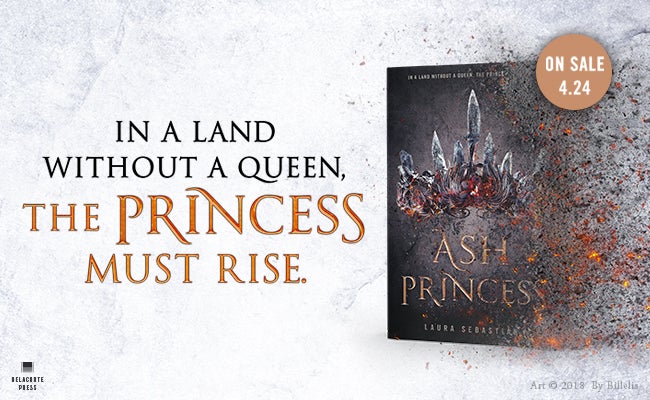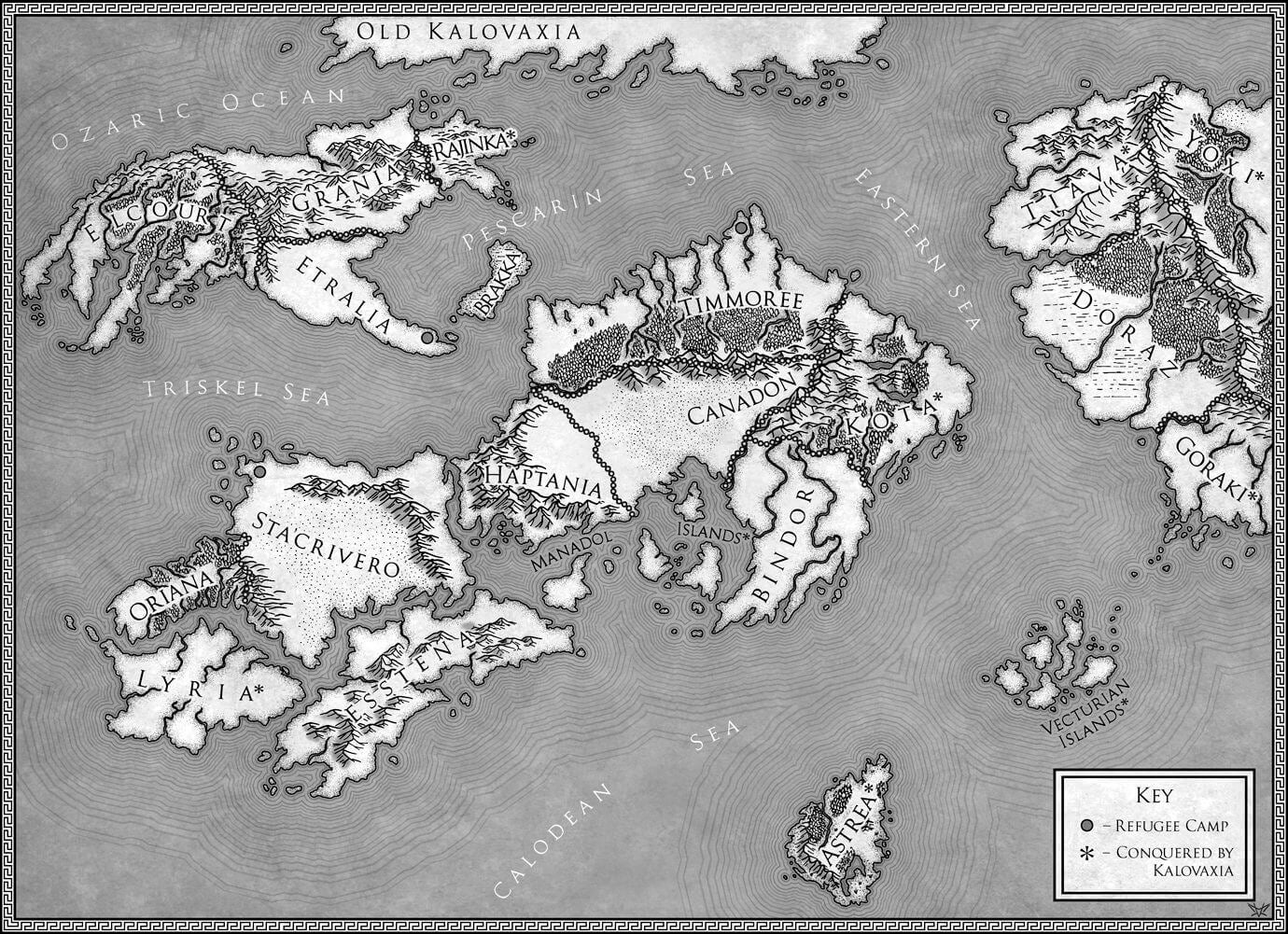Can’t wait to meet Theodosia and experience the magic of Ash Princess by Laura Sebastian? Read the first chapter here!

Preface
The last person who called me by my true name was my mother, with her dying breath. When I was six years old, my hand was still small enough that hers covered it completely. She squeezed it so painfully tight that I hardly noticed anything else. So tight that I hardly noticed the silver of the knife pressing against her throat or the fear in her eyes.
“You know who you are,” she said to me. Her voice didn’t waver, even as drops of blood bloomed where the blade cut her skin. “You are our people’s only hope, Theodosia.”
And then they cut her throat and they took my name.

Thora
“Thora!” I turn to see Crescentia barreling toward me down the gilded palace hallway, pink silk skirts lifted as she runs and a broad grin spread across her lovely face.
Her two maids struggle to keep up with her, their emaciated frames drowning in homespun dresses.
Don’t look at their faces, don’t look, I tell myself. Nothing good ever comes of looking, of seeing their dull eyes and hungry mouths. Nothing good ever comes of seeing how much they look like me, with their tawny skin and dark hair. It only makes the voice in my head grow louder. And when the voice grows loud enough to push past my lips, the Kaiser grows angry.
I will not anger the Kaiser and he will keep me alive. This is the rule I’ve learned to follow.
I focus on my friend. Cress makes everything easier. She wears her happiness like the sun’s rays, radiating it to warm those around her. She knows I need it more than most, so she doesn’t hesitate to fall into step next to me and link our arms tightly.
She is free with her affection in a way only a few blessed people can be; she has never loved someone and lost them. Her effortless, childlike beauty will stay with her until she is an old woman, all dainty features and wide crystalline eyes that have seen no horrors. Pale blond hair hangs in a long braid pulled over her shoulder, studded with dozens of Spirit gems that wink in the sunlight pouring through the stained glass windows.
I can’t look at the gems either, but I feel them all the same: a gentle pull beneath my skin, drawing me toward them, offering me their power if I’ll only take it. But I won’t. I can’t.
Spiritgems used to be sacred things, before Astrea was conquered by the Kalovaxians.
The gems came from the caves that ran beneath the four major temples—one for each of the four major gods and goddesses of fire, air, water, and earth. The caves were the center of their powers, so drenched in magic that the gems inside them took on magic of their own. Before the siege, the devout would spend years in the cave of the god or goddess they swore allegiance to. There, they would worship their deity, and if they were worthy, they would be blessed, imbued with their god’s or goddess’s power. They then used their gifts to serve Astrea and its people as Guardians.
Back then there weren’t many who weren’t chosen by the gods—a handful a year, maybe. Those few went mad and died shortly after. It was a risk only the truly devout took. Being a Guardian was a calling—an honor—yet everyone understood what was at stake.
That was a lifetime ago. Before. After the siege, the Kaiser had the temples destroyed and sent tens of thousands of enslaved Astreans to the caves to mine the gems. Living so close to the power of the gods is no longer a choice people make, but one that is made for them. There is no calling or allegiance sworn, and because of that, most people who are sent to the mines quickly lose their minds and, shortly after, their lives.
And all that so the wealthy can pay a fortune to cover them- selves in gems without even uttering the names of the gods. It’s sacrilege to us, but not to the Kalovaxians. They don’t believe. And without the blessing of the gods—without the time spent deep in the earth—they can possess only a shadow of a true Guardian’s power, no matter how many gems they wear, which is plenty for most of them. The Water Gems in Cress’s braid could give a trained Guardian the power to craft an illusion strong enough to create a new face entirely, but for Cress they only lend her skin a glow, her lips and cheeks a pretty flush, her golden hair a shine.
Beauty Gems, the Kalovaxians call them now.
“My father sent me a book of poems from Lyre,” she tells me. Her voice grows tense, as it always does when she speaks of her father, the Theyn, with me. “We should take it up to the pavilion and translate it. Enjoy the sun while we still have it.”
“But you don’t speak Lyrian,” I say, frowning. Cress has a knack for languages and literature, two things her father has never had the patience for. As the Kaiser’s best warrior and the head of his army, the Theyn understands battle and weaponry, strategy and bloodshed, not books and poetry, but he tries for her sake. Cress’s mother died when Cress was only a baby, so the Theyn is all she has left by way of family.
“I’ve picked up a few phrases here and there,” she says, waving a hand dismissively. “But my father had the poet translate some so I can puzzle out the rest. You know how my father enjoys his puzzles.”
She glances sideways at me to see my reaction, but I’m careful not to give one.
I’m careful not to imagine Cress’s father pressing his dagger to a poor scrawny poet’s neck as he hunches over his work, or the way he held it to my mother’s so long ago. I don’t think of the fear in her eyes. Her hand in mine. Her voice, strong and clear even then.
No, I don’t think of that. I’ll go mad if I do.
“Well, we’ll solve them quickly, between the two of us,” I tell her with a smile, hoping she believes it.
Not for the first time, I wonder what would happen if I didn’t suppress a shudder when she mentioned her father. If I didn’t smile and pretend he wasn’t the same man who killed my mother. I like to believe Cress and I have been friends long enough that she would understand, but that kind of trust is a luxury I don’t have.
“Maybe Dagmær will be there,” Crescentia says, dropping her voice to a conspiratorial whisper. “You missed her . . . bold fashion choice at the countess’s luncheon yesterday.” Her eyes glint with a smile.
I don’t care. The thought comes sudden and sharp as a bee-sting. I don’t care if Dagmær attended the luncheon in the nude. I don’t care about any of it. I push the thought down deep and bury it, as I always do. Thoughts like that don’t belong to Thora; they belong to the voice. Usually it’s only a whisper, easy enough to ignore, but sometimes it grows louder and spills into my own voice. That is when I get into trouble.
I anchor myself to Cress, her easy mind, her simple pleasures.
“I doubt anything can top the ostrich feathers she was covered in last month,” I whisper back, making her giggle.
“Oh, it was far worse this time. Her gown was black lace. You could practically make out her intimate attire—or lack thereof!”
“No!” I shriek, pretending to be scandalized.
“Yes! They say she’s hoping to entice Duke Clarence,” Cress says. “Though why, I can’t imagine. He’s old enough to be her father and he smells like rotten meat.” She wrinkles her nose.
“I suppose when you consider her actual father’s debts . . .” I trail off, arching an eyebrow.
Crescentia’s eyes widen. “Really? Where did you hear that?” she gasps. When I only smile in response, she sighs and elbows me lightly in the side. “You always know the best gossip, Thora.”
“That’s because I listen,” I say with a wink.
I don’t tell her what I’m really listening for, that I sift through each vapid rumor for whispers of Astrean resistance, for any hope that someone is still out there, that someday they might rescue me.
In the years after the siege, there were always stories about rebel Astreans striking out against the Kaiser. Once a week, I would be dragged out to the capital square to be whipped by one of the Kaiser’s men and made an example of while the heads of fallen rebels stood rotting on pikes behind me. I knew those faces most of the time: Guardians who had served my mother, men and women who had given me candy and told me stories when I was young. I hated those days, and most of the time I hated the rebels because it felt like they were the ones hurting me by incurring the Kaiser’s wrath.
Now, though, most of the rebels are dead and there are only whispers of rebellion, fleeting afterthoughts of gossip when the courtiers run out of other things to talk about. It’s been years since the last rebel was caught. I don’t miss those punishments, always more brutal and public than any others, but I do miss the hope that clung to me, the feeling that I was not alone in the world, that one day—maybe—my people would succeed and end my misery.
Footsteps grow louder behind us, too heavy to belong to Cress’s slaves.
“Lady Crescentia, Lady Thora,” a male voice calls. Cress’s hold on my arm tightens and her breath catches.
“Your Highness,” Cress says, turning and dropping into a curtsy, pulling me with her. The title sends my heart racing, even though I know it’s not the Kaiser. I would know his voice anywhere. Still, I don’t fully relax until I rise from my curtsy and confirm that I’m right.
The stranger shares the same long wheat blond hair and cold blue eyes, the same square jawline, as the Kaiser, but the man in front of me is much younger, maybe a year older than I am.
Prinz Søren, I realize, surprised. No one has spoken of his return to court, which is surprising because the Kalovaxians are infatuated with their Prinz far more than they are with the Kaiser.
The last time I saw him was almost five years ago, when he was a scrawny twelve year old with round cheeks and a wooden sword always in hand. The man in front of me is no longer scrawny, and his cheeks have lost that childish roundness. A sword still hangs in the scabbard on his hip, but it isn’t wooden anymore. It’s a pockmarked wrought iron blade, its hilt glittering with Spiritgems, for strength this time.
As a child, I saw Earth Guardians strong enough to haul boulders three times their weight as if they were nothing but air, but I doubt the Prinz’s Spiritgems do much more than add an extra few pounds of force to his blows. Not that it really matters. Over the five years of Søren’s training with the Theyn, that sword has drawn more than its fair share of blood. The court is always abuzz with whispers of the Prinz’s prowess in battle. They say he’s a prodigy, even by Kalovaxian standards. The Kaiser likes to treat the Prinz as an extension of himself, but Prinz Søren’s achievements only serve to highlight the Kaiser’s own shortcomings. Since taking the throne, the Kaiser has grown lazy and content, more interested in feasting and drinking than taking part in battles.
I wonder what the Prinz is doing back after so many years, though I suppose his apprenticeship with the Theyn is over. He’s officially an adult now, and I can only assume he’ll be leading his own armies soon.
He gives a shallow bow and clasps his hands behind his back. His placid expression doesn’t change; it might as well be carved from marble. “It’s good to see you both again. I trust you’ve been well.”
It’s not a question, really, but Cress still answers with a flustered yes, tucking a strand of hair behind her ear and smoothing the folds of her skirt, barely able to meet his eyes. She’s been swooning over him since we were children, along with every other girl our age who grew up imagining herself a prinzessin. But for Cress, it’s never been a hollow fantasy. Astrea is only one of the territories her father has won for the Kaiser. They say her father has taken more kingdoms than any other warlord, and no one can argue that the elevation of his daughter to prinzessin would be a just reward for such loyalty. Since Cress came of age six months ago, the whispers about such a match have grown deafening at court.
Another reason for his return, maybe?
If those whispers reached Søren, wherever he’s been, he doesn’t show it. His eyes glide over Cress as though she were nothing but air and light, landing instead on me. His brow furrows, the same way his father’s does when he looks at me, though at least it isn’t followed with a smirk or a leer.
“I’m glad to hear it,” he says to Cress, cool and clipped, though his eyes stay on mine. “My father is requesting your presence, Lady Thora.”
Fear wraps around my stomach like a hungry python, tightening, tightening, until I can’t breathe. The urge to run rears up in me and I struggle to keep my legs still.
I haven’t done anything. I’ve been so careful. But then, I don’t have to do anything to earn the Kaiser’s wrath. Anytime there’s a hint of rebellion in the slave quarter or an Astrean pirate sinks a Kalovaxian ship, I pay the price. The last time he summoned me, barely a week ago, was to have me whipped in response to a riot in one of the mines.
“Well.” My voice quavers despite my best efforts to keep it level. “We shouldn’t keep him waiting.”
For a brief moment, Prinz Søren looks like he might say something, but instead, his mouth tightens and he offers me his arm.




